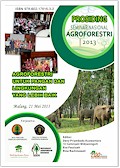| Paper |
 |
|
| Title | Strategi Penghidupan Petani Agroforest Dalam Menghadapi Perubahan Cuaca Yang Tidak Menentu: Contoh Kasus Di Sulawesi Selatan Dan Sulawesi Tenggara | | Author | Endri Martini, Sonya Dewi, Janudianto, Anang Setiawan and James M Roshetko | | Editor | Devy Priambodo Kuswantoro, Tri Sulistyati Widyaningsih, Eva Fauziyah and Rina Rachmawati | | Year | 2013 | | Parent Title | Prosiding Seminar Nasional Agroforestri 2013. “Agroforestri untuk Pangan dan Lingkungan yang Lebih Baik”. Malang, 21 Mei 2013 | | Publisher | Balai Penelitian Teknologi Agroforestry, Fakultas Pertanian Universitas Brawijaya, World Agroforestry Centre (ICRAF) - Southeast Asia Regional Program, and Masyarakat Agroforestri Indonesia | | City of Publication | Malang, Indonesia | | Date | 2013-05-21 | | Pages | 604-609 | | Call Number | PP0340-14 | | Keywords | off-farm income, fruit trees, microcredit, rainfall, wind-storm |
|
| Abstract: |
| Climate change has resulted increasing intensity of natural hazards such as floods, droughts, wind-storm, that
has caused failure in agricultural production and threaten farmers livelihood stability. Agroforest systems are
known as the less vulnerable system to climate change, however, farmers will also need to develop strategy to
cope with the negative impacts. Sulawesi is interesting as it is located in between wet west Indonesia with dry
east Indonesia rainfall regime, where the communities may experience double impact if hazards happen
consecutively from both regimes. Thus, this study was conducted to understand coping strategies of agroforest
farmers in Sulawesi to survive with worst impacts of climate change. Information on farmer’s perception on
natural hazards exposures, responses and coping capacities was collected through Focus Group Discussion
(FGD) in 8-10 groups in South and Southeast Sulawesi. Results shows farmers in both provinces feel an
increasing incidence of intensive rainfall and wind-storm over the past 10 years that has fluctuated their
agriculture production. In agroforest systems, climate change has caused a decrease in fruit production or even
zero production as for clove trees that resulted instability in farmers’ income. In that case farmers will migrate
to urban areas to look for off farm source of livelihood as alternative. Farmers will manage their garden again
if the weather is conducive. Farmers with no capacity to look for other source of livelihood, will borrow money
with high interests (>20%) to the lenders. Thus, government programs for climate change adaptation also need
to focus on microcredit and other programs to assist farmers in creating new sources of livelihoods if failure
happens to their agricultural production. |
|
|
Download file(s): Click icon to download/open file.
|
| |
File Size |
Description |

|
997 KB |
Softcopy |
|
|
|
| Viewed in 1303 times. Downloaded in 614 times. |